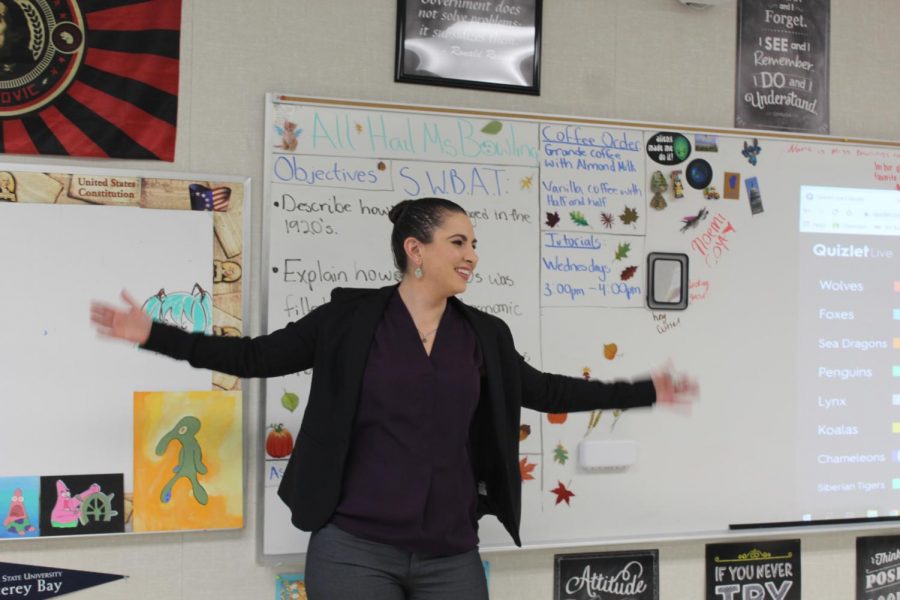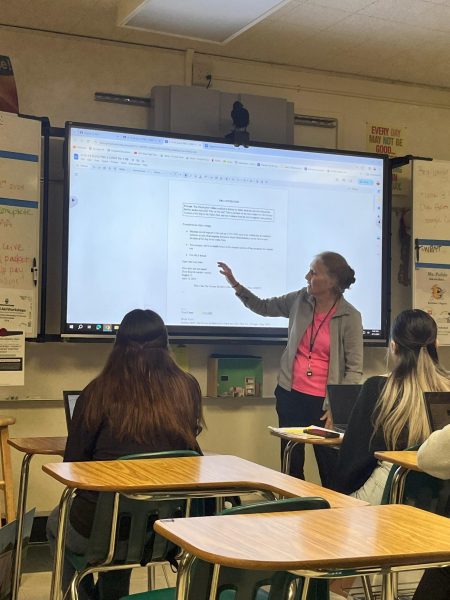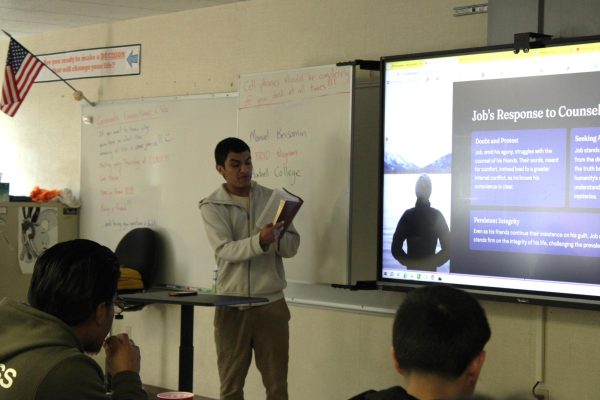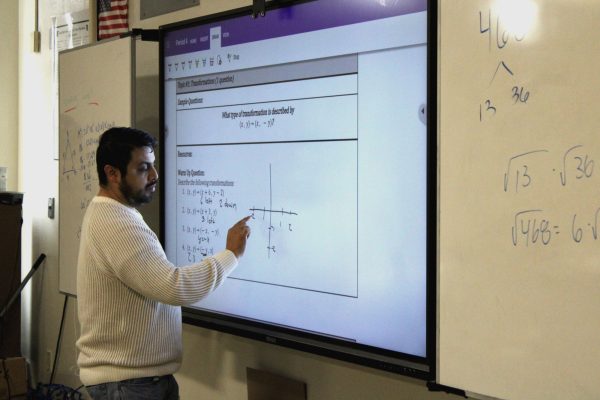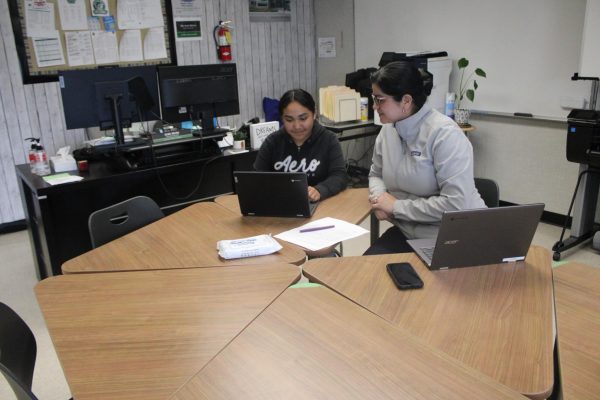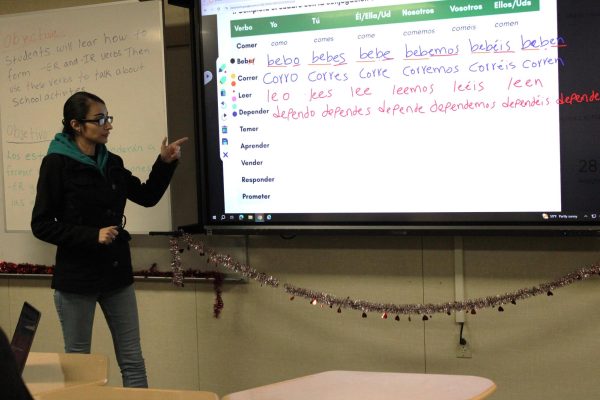The Insight on AP
Bowling and Guido
Social studies teacher Jenness Bowling encouraging her students on a game of Quizlet. Bowling, along with Mariela Guido are the new AP Coordinators, in addition to teaching five individual classes.
While most students are familiar with Advanced Placement classes, they don’t know there are teachers who are responsible for making sure both teachers and students are prepared to take the tests. These people are the AP coordinators, and this year social science teachers Janesse Bowling and Mariela Guido have taken the reins.
Both teachers had their reasons for taking on the job. Bowling said, “I’m in the process of getting my Masters right now and will move up eventually to admin and so this is one stepping stone that can help prepare me for those extra responsibilities of being an administrator.” Guido decided to take the job, “to get the experience and to see how all the AP stuff works.”
The coordinators are responsible for doing a lot of work that is related to everything connected to AP. Both Bowling and Guido share the work that they are expected to complete. They are responsible for ordering the tests and making sure all the students get the correct tests. Both make sure that there is a place for every student taking the test. They have a location appointed to them, so they will know ahead of time where they need to be. They act as proctors, people who monitor the students during the examination and make sure that there are enough proctors to cover all the tests on a given day. If any issues happen during the testing session, like cheating, they are responsible for reporting the issue as soon as they can. They also make sure that the tests are sent to back to College Board. “It can be daunting taking on a new role and responsibilities,” Bowling said.
Both teachers have begun having challenges from taking on these new tasks, and they anticipate that they will have a lot more in the future. They mentioned that one major challenge for both of them was the communication between them and the AP teachers. Bowling said, “A major challenge now is communication between myself and administration, and myself and the AP teachers because there are over twenty of them.”
In addition to dealing with adjusting to their new responsibilities, they also had to deal with new changes made by College Board, both in the testing and the tests themselves. They now need to order the tests in November, compared to last year that they were ordered in February. The tests that got changed were AP Economy and Government, AP United States Government and Politics, AP Comparative Government and Politics, AP World History, AP Biology, and AP English Language and Composition.
The students also have a different way of signing up for the tests. Every student is assigned an account on the MyAP site that can be reached through the Chromebooks that all students have access to. All the AP teachers have a code for their individual classes that they give to their students to be able to sign up for the class. This new site is a tool where teachers can assign work to the students so that they can practice material that is related to the test and eventually master. “It’s an extra resource to help students prepare for the AP test,” says Bowling.
The coordinators were not the only ones who had to adjust, the teachers needed to modify their practices. “This year for the AP English Language test they changed the multiple-choice and reduced the amount of questions to 40 or 45, which is down about 10 or so,” said Mick Battaglini, the AP English Language teacher. “They’ve changed some of the questions and they’ve changed the scoring on the essays from a 9 point scale to kind of a 6 point scale. I’m not sure how I feel about the new scoring for the essay. I’ve really liked the 9 point scale which is done more holistically, and the new scale is more specific about certain things.” He further explains, “Their rationale was that it provided more feedback that people were getting. I don’t know whether the students will ever actually see that feedback. I guess the score potentially could be broken down by those three categories and the students on their scored report would get that, so that would be good if that happened. But AP has not really shared how the tests were scored (in the past) other than the overall score, so if they do that will be positive because students would understand better why they got the score that they did.”
In the AP Government and Politics test, changes occurred as well. Matthew Barclay, one of the AP Government and Politics teachers said, “The essay structure is very different from its predecessor, meaning that there are four different types of Frequency Response Questions or FRQ’s, and they’re designed to measure critical thinking skills and analyses rather than just memorization of facts. There is more multiple-choice questions and even the multiple-choice questions have a more stimulus-response.” Something difficult that he is expecting is “It’s a little more challenging because you get used to teaching a certain way, I’ve been doing it now for 13 years and so I think the new format is tricky but I feel like I’m getting it.”
As for the AP Biology tests, “They have actually removed one of the topics now for the actual AP test. I believe that they have removed some written response questions and the written questions, that section was also removed. They added some formulas and they got rid of some formulas that now the students are not responsible for,” said Lucero Cruz, the Biology AP teacher.
Many teachers had positive reactions relating to the new MyAP site. Barclay said, “I think the new changes are really good. I like the fact that students have to understand concepts in more depth rather than just through memorizing facts that they probably will forget pretty quickly down the road.” Sandra Vasquez, one of the AP US History teachers said, “It’s nice in that they’re like practice exposures for the tests and really seeing the guidelines on how they’re being evaluated in order for them to do better, if they know the criteria for the test they can better prepare for it.” Catharina Beussen, the AP Statistics teacher said, “The fact that they have extra practice now, multiple-choice practice and free-response practice available online, I think will help students ultimately be better prepared.” Overall, most teachers said that they liked the changes because the students are now able to be more prepared for the official AP test through practice the site has to offer.
However, some teachers are also having difficulties in working with the new site. Anna Rosa Martinez, one of the Spanish AP teachers said, “I’m not a big fan.” She said teachers received no training on how the new site works, as far as she knows, which is a big downside to it. Bowling said, “I did not have any teachers personally approach me to complain about the lack of training.” However, she did say that she would try to help the teachers who were having difficulties.
The AP program at Alisal continues to move forward with yearly changes happening. Although some teachers have to get used to the changes, Bowling said she is ready to help the teachers “I think next year we will have a short meeting about the new changes to AP and the ordering process in order to better support our teachers.” Overall, Bowling agrees with most of the teachers in that the new MyAP site is a very positive change as it’s a new resources for the students to be able to get ready for the actual tests. In addition, the changes to the tests help the school stay up to date and the students are able to see more of how their work was graded when they receive their scores.
Your donation will support the student journalists of Alisal High School. Your contribution will allow us to purchase equipment and cover our annual website hosting costs.



